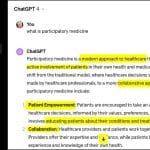Press coverage of the Pew Internet Project’s recent report, “Information Searches That Solve Problems,” focused on how “libraries still matter” especially among young people.
One aspect that I think merits further attention is how people interact with various information sources when they are dealing with a serious illness or health concern.
For example, in the chart on page 15 of the report, “Source of Help by Type of Problem,” we see that eight in ten respondents who recently needed health information said they turned to a professional for advice. About half turned to friends and family; 46% turned to the internet. In other words, professionals were the dominant source for people with health questions, which is not what we see in any of the other topics covered in the survey: education, taxes, Medicare/Medicaid, changing job status, or Social Security. For those topics, the internet or a government agency played much more important roles than did professionals.
This is different from some findings I highlighted in our “E-patients With a Disability or Chronic Disease” report. According to HINTS 2003, sponsored by the National Cancer Institute, 49% of adults said they would go first to a health care provider if they had a strong need to get information about cancer. In the same survey, however, people who said they had recently looked for cancer information for themselves were likely to say they looked online – 46%, vs. 11% who had consulted a health care professional.
The differences can mostly be attributed to the fact that each survey was asking somewhat different questions. The “libraries” survey focused on people’s actual behavior after they learned they had a health problem, whereas the HINTS study asked about potential future behavior. It’s likely that for most people, both findings are correct. If they had been through a serious problem they would almost surely have consulted a doctor; and if they were just starting to explore a possible health problem, they might go to the internet to try to figure out what was going on.
I don’t think many people dispute the e-patient trend, but it is important to remember that the internet is more often a supplement to other sources, not a replacement.






comScore just published a new study that dovetails with the Pew Internet report (http://www.comscore.com/press/release.asp?press=2012) entitled Women More Likely to Turn to Internet than Friends or Family for Health Information.
This new (commercial) study states that “- second only to consulting physicians – women turn most often to the Internet for health information. Eighty-five percent of women using the Internet have researched women’s health issues online while two out of three (63 percent) have used the Internet specifically to learn about birth control options.”